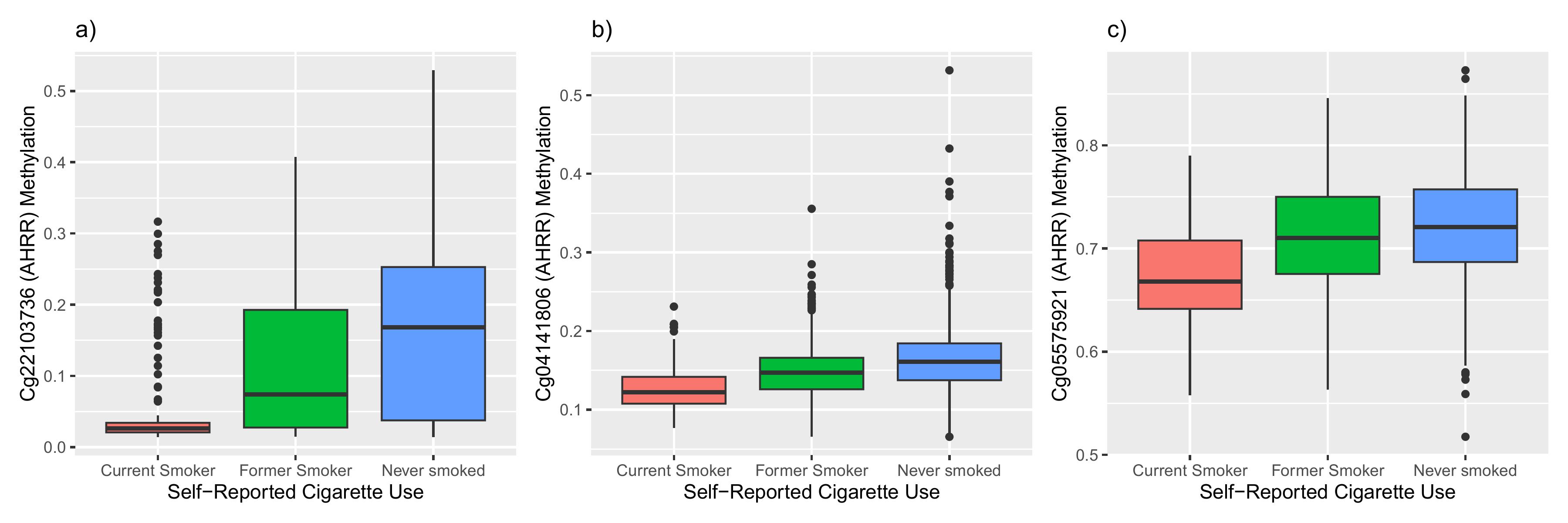Session Information
Session Type: Poster Session A
Session Time: 10:30AM-12:30PM
Background/Purpose: Cigarette smoking has been linked to the development of several autoimmune diseases, including Sjögren’s Disease (SjD). Since DNA methylation (DNAm) is altered by cigarette smoking and plays a significant role in autoimmune disease pathophysiology, it may provide some insight into the influence of smoking on SjD progression. Although previous studies have identified genome-wide DNAm changes in whole blood associated with smoking, similar analyses have not yet been conducted in the exocrine glands, which are the primary target tissues in SjD. Salivary glands, in particular, are directly exposed to cigarette smoke and may exhibit distinct epigenetic changes. Here, we aim to compare DNAm in labial salivary gland (LSG) tissue among individuals with different self-reported smoking behaviors.
Methods: We obtained LSG DNAm data from the Sjögren’s International Collaborative Clinical Alliance (SICCA) cohort (n = 1,453) that was profiled using the Illumina EPIC v1.0 array (~850,000 CpG sites). We used linear models (limma) to identify sites with differential methylation by smoking status (current v. never smoker, former v. never smoker), adjusting for age, sex, batch effects, SjD status as determined by 2016 ACR-EULAR classification criteria, estimated cell type proportions, and genetic principal components. GO, KEGG, and Reactome pathway enrichment analyses were conducted.
Results: We identified 106,285 differentially methylated sites in current smokers and 13 sites in former smokers at a false discovery rate (q) < 0.05. Of these, 3,891 CpG sites in current smokers and only one in former smokers had at least a 3% average DNAm difference compared to never smokers. These were enriched in pathways related to cellular migration, morphogenesis, and neuronal development. The site cg22103736 (-7.1%, FDR q = 2.3e-29) showed the strongest combination of effect size and significance in both current and former smokers. Cg22103736 is located in AHRR, which encodes aryl hydrocarbon receptor repressor and is a gene widely linked to smoking-related changes in whole blood DNAm. The median methylation value of cg22103736 among current smokers was very low (0.026) and demonstrated a stepwise increase for former and never smokers (Figure 1a). This trend was replicated in another AHRR CpG, cg04141806 (Figure 1b). Interestingly, a well-known CpG within AHRR that differentiates smoking behavior in whole blood, cg05575921, did not have as large differences in DNAm between smoking status groups in the gland tissue (Figure 1c).
Conclusion: Our findings suggest that cigarette smoking may significantly perturb normal cellular processes in salivary glands. These changes occur in many more CpGs with stronger and more significant associations in current compared to former smokers. Pathway analysis implicated processes important for fibrosis, such as epithelial-mesenchymal transition and extracellular matrix remodeling, indicating that smoking may exacerbate and accelerate gland atrophy in SjD patients or individuals with xerostomia. The limited number of significant results in former smokers indicates that quitting smoking may allow individuals to acquire DNAm profiles comparable to that of individuals who have never smoked.
 Figure 1. Stepwise relationship between self-reported cigarette use and methylation beta values in AHRR CpGs including a) cg22103736, one of the strongest and most significant differentially methylated positions (DMPs), b) cg04141806, another significant DMP, and c) cg05575921, a DMP that has been widely associated with smoking in whole blood DNAm studies.
Figure 1. Stepwise relationship between self-reported cigarette use and methylation beta values in AHRR CpGs including a) cg22103736, one of the strongest and most significant differentially methylated positions (DMPs), b) cg04141806, another significant DMP, and c) cg05575921, a DMP that has been widely associated with smoking in whole blood DNAm studies.
To cite this abstract in AMA style:
Bhatt P, Horton M, Shiboski C, Barcellos L, Criswell L. DNA Methylation Signatures of Smoking in Labial Salivary Gland Tissue in a Sjögren’s Disease Cohort [abstract]. Arthritis Rheumatol. 2025; 77 (suppl 9). https://acrabstracts.org/abstract/dna-methylation-signatures-of-smoking-in-labial-salivary-gland-tissue-in-a-sjogrens-disease-cohort/. Accessed .« Back to ACR Convergence 2025
ACR Meeting Abstracts - https://acrabstracts.org/abstract/dna-methylation-signatures-of-smoking-in-labial-salivary-gland-tissue-in-a-sjogrens-disease-cohort/
